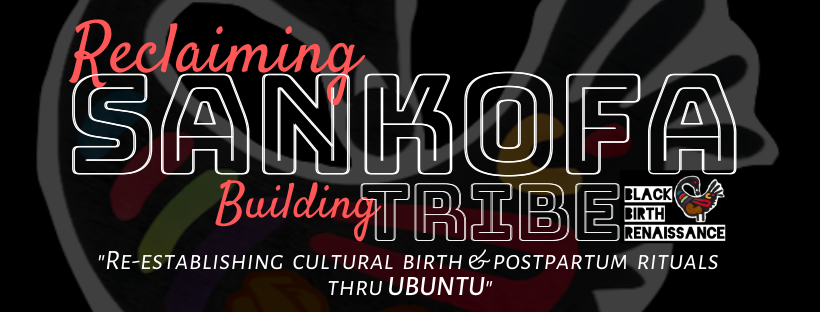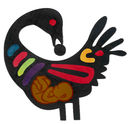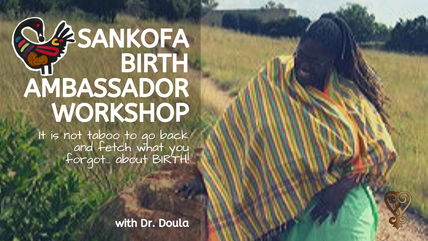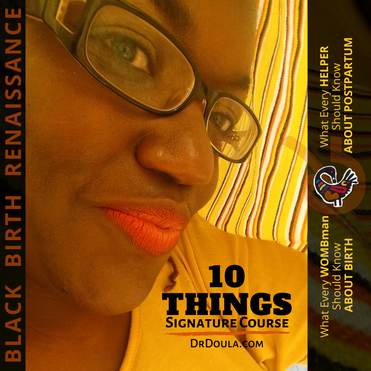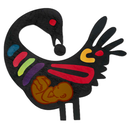 "Sankofa" BIRTH
"Sankofa" BIRTH
SANKOFA is an African word from the Akan tribe in Ghana that means "it is not taboo to GO BACK and FETCH what you forgot". This is especially true about BIRTH! You will notice that Dr. Doula also references the Zulu Nation of South Africa in her explanations of birthing practices. Much of her connection back to the African continent has involved learning from South Africa and she uses what has been taught, along with her family's experiences and research, to affirm the universal birth and postpartum practices of African people around the world. The ethnic mixtures of most Diasporic Africans makes the integration of diverse African languages and cultures appropriate while seeking to reclaim their indigenous traditions. Through Dr. Doula's virtual and in-person mentoring and workshops, you can reach back to practices that have sustained Diasporic African women throughout their childbearing years for centuries.
Birth and Postpartum Traditions
SHOULDN'T BE MYSTERIOUS or feel like they belong to someone else. THEY BELONG TO US. They are a part of THE INHERITANCE that has been LEFT FOR US. Make sure YOU, your FRIENDS and FAMILY know the basics about BIRTH and POSTPARTUM and learn from that perspective honors TRADITIONS practiced by BLACK FAMILIES throughout the AFRICAN DIASPORA for hundreds of years.
#LearnYourLegacy
#ReclaimBirthRites
Umsizi is the isiZulu word for helper. During efforts to establish norms and standards for integrating traditional midwives into the broader culture, umsizi was the word that traditional midwives and healers chose to describe some of the people that assist the ababelethisi (midwives). Traditional healers (izangoma) and abalelethisi across South Africa described the work that she and other types of abasizi (helpers) and abazanyane (companions) do. Dr. Doula shares what she has learned about basic expectations of helpers and companions during birth and postpartum through Sankofa Tribe sessions and workshops. Understanding the basic roles and expectations of abasizi and abazanyane during the childbearing year, from an African perspective, is one way to re-establish the indigenous knowledge and practices that have been lost, stolen, forgotten, surrendered & abandoned in the African Diaspora.
You can begin to "reclaim your birth rites" and build legacy as a part of SANKOFA TRIBE with video sessions, in-person workshops or group intensive.
Umdlezane is the isiZulu word for "new mother" and when a woman is umdlezane it is understood that she is in her postpartum period, breastfeeding and in need of certain support. Traditionally, the umdlezane would sit and do nothing, especially while she is still bleeding. Those around her cater to her as one who who needs rest and has completed a major work. For her first birth, she would go back home to her mother who would teach her how to take care of herself and her umntwana (baby). The umdlezane has people that cook for her and bring food to her in her room. She does not worry about cleaning anything. Often there will be a younger or older woman sent to look after the mother, called umzanyana (companion, which is also the word for placenta), to take care of whatever needs she has, including helping care for the baby so that she can sleep and allow her body to be fully restored.
While in modern culture, the umzanyana would be a service that people pay for, like a postpartum doula, in traditional cultures these roles that people played within the community were reminders of UBUNTU. Ubuntu is an isiZulu word meaning I am because we are. Following this principle allowed every person to feel purposeful as contributors to the community by looking for ways that they could contribute so that everyone helped each other.
If you are interested in learning ways that you can begin to support birthing people in your life, continue reading to see the opportunities for mentoring and workshops below.
While in modern culture, the umzanyana would be a service that people pay for, like a postpartum doula, in traditional cultures these roles that people played within the community were reminders of UBUNTU. Ubuntu is an isiZulu word meaning I am because we are. Following this principle allowed every person to feel purposeful as contributors to the community by looking for ways that they could contribute so that everyone helped each other.
If you are interested in learning ways that you can begin to support birthing people in your life, continue reading to see the opportunities for mentoring and workshops below.
Reclaiming Birth Rites & Restoring Family Practices
The truth is that the doula profession is less than three decades old, but the work that doulas do is ANCIENT WORK that has always been a part of traditional cultures around the world. It is the same work that has been done by mothers, grandmothers, aunties, sisters and close friends... BEFORE there were doulas. It is the reason why in most traditional cultures there is no word specifically used to describe this role as a profession, like most cultures have for midwife. The knowledge of how to care for new mothers was “common” and passed down from generation to generation through practices that reinforced connection and knit families together.
Through "Ten Things" Workshop sessions and the "Sankofa Ways" Workshop, Dr. Doula shares fundamental practices of birth and postpartum care from the African continent that have also been essential to sustain the African Diaspora for centuries. As we re-establish cultural birth and postpartum practices, we will build TRIBE.
People of African descent have always needed to be equipped to HELP themselves, HEAL themselves, and SAVE themselves. Make sure you KNOW THE BASICS about traditional ways of caring for women during the childbearing year.
Through "Ten Things" Workshop sessions and the "Sankofa Ways" Workshop, Dr. Doula shares fundamental practices of birth and postpartum care from the African continent that have also been essential to sustain the African Diaspora for centuries. As we re-establish cultural birth and postpartum practices, we will build TRIBE.
People of African descent have always needed to be equipped to HELP themselves, HEAL themselves, and SAVE themselves. Make sure you KNOW THE BASICS about traditional ways of caring for women during the childbearing year.
BEFORE THERE WERE DOULAS... there were mothers, grandmothers, aunts, sisters and friends who supported the mothers in their lives during the their childbearing years. Do you desire to support women and families but not sure where to begin? A Sankofa Birth Ambassador (SBA) Workshop is your starting place. Find out what you need to know to begin to RECLAIM YOUR BIRTH RITES and support the women in your life and community.
participate in group mentoring sessions w/ Dr. Doula, access resources & benefits, complete assignments, and receive Certificate of Completion
participate in group mentoring sessions w/ Dr. Doula, access resources & benefits, complete assignments, and receive Certificate of Completion
|
|
|
|
“10 THINGS"... WHAT EVERY WOMAN SHOULD KNOW ABOUT BIRTH: Foundational information for pregnant women, fathers/partners, support people and those who feel 'called' to the childbearing year
Includes fundamental knowledge that is important for birthing mothers and their support people to know and consider while preparing for birth. It includes information about modern practices and those that acknowledge women of African descent and diverse cultures strong birth traditions within society. General topics covered are: From Back Then to Here & Now, The Medical Side of Birth, Envisioning Your Birth, Integrating Traditions, Bonding with Baby "10 THINGS"... WHAT EVERY HELPER SHOULD KNOW ABOUT POSTPARTUM: Practical guidelines for pregnant mothers, their partners, family and friends desiring to support new mothers during postpartum Derived from common practices found through research of African cultures that are common practices, whether in the north, south, east, and west of the continent. These indigenous practices have also been continued throughout the African Diaspora and are foundational to the care of new mothers. General topics are: Becoming a Helper, Nurturing the New Mom, Breastfeeding, Rites of Passage, Postpartum Depression |
"SANKOFA WAYS" MENTORING INTENSIVE
In person mentoring in traditional Birth & Postpartum practices In traditional, indigenous cultures, women would not be left to manage alone after they give birth. They would be surrounded by women who knew ways that they could support her and restore her as she sought to adjust to her new life with her baby, a time when women are most vulnerable. "Sankofa Ways" Mentoring Intensive involves practices that are used in the New Mom Renewal Session. The mentoring session is approached from a mind/soul/body/spirit perspective and Dr. Doula facilitates an environment that encourages abasizi (helpers) and abazanyane (companions) to incorporate their own unique gifts, skills and expertise into their work. Birth and postpartum techniques practiced during the in-person, hands-on intensive:
|
|
Birth and Postpartum Traditions SHOULDN'T BE MYSTERIOUS or feel like they belong to someone else. THEY BELONG TO US. They are a part of THE INHERITANCE that has been LEFT FOR US. Make sure YOU, your FRIENDS and FAMILY know the basics about BIRTH and POSTPARTUM and learn from that perspective honors TRADITIONS practiced by BLACK FAMILIES throughout the AFRICAN DIASPORA for hundreds of years. #LearnYourLegacy #ReclaimBirthRites |
Umdlezane is the isiZulu word for "new mother" and when a woman is umdlezane it is understood that she is in her postpartum period, breastfeeding and in need of certain support. Traditionally, the umdlezane would sit and do nothing, especially while she is still bleeding. Those around her cater to her as one who who needs rest and has completed a major work. For her first birth, she would go back home to her mother who would teach her how to take care of herself and her umntwana (baby). The umdlezane has people that cook for her and bring food to her in her room. She does not worry about cleaning anything. Often there will be a younger or older woman sent to look after the mother, called umzanyana (companion, which is also the word for placenta), to take care of whatever needs she has, including helping care for the baby so that she can sleep and allow her body to be fully restored.
While in modern culture, the umzanyana would be a service that people pay for, like a postpartum doula, in traditional cultures these roles that people played within the community were reminders of UBUNTU. Ubuntu is an isiZulu word meaning I am because we are. Following this principle allowed every person to feel purposeful as contributors to the community by looking for ways that they could contribute so that everyone helped each other.
If you are interested in learning ways that you can begin to support birthing people in your life, continue reading to see the opportunities for mentoring and workshops below.
While in modern culture, the umzanyana would be a service that people pay for, like a postpartum doula, in traditional cultures these roles that people played within the community were reminders of UBUNTU. Ubuntu is an isiZulu word meaning I am because we are. Following this principle allowed every person to feel purposeful as contributors to the community by looking for ways that they could contribute so that everyone helped each other.
If you are interested in learning ways that you can begin to support birthing people in your life, continue reading to see the opportunities for mentoring and workshops below.
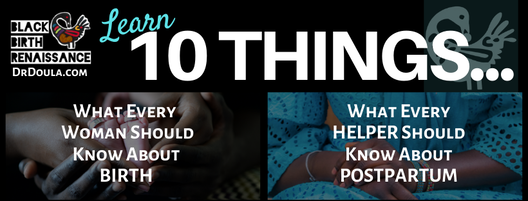
SANKOFA TRIBE INTENSIVE
Helping get back to the basics of "building birth legacy" and "re-establishing cultural postpartum rituals"
Umsizi is the isiZulu word for helper. During efforts to establish norms and standards for integrating traditional midwives into the broader culture, umsizi was the word that traditional midwives and healers chose to describe some of the people that assist the ababelethisi (midwives). Traditional healers (izangoma) and abalelethisi across South Africa described the work that she and other types of abasizi (helpers) and abazanyane (companions) do. Dr. Doula shares what she has learned about basic expectations of helpers and companions during birth and postpartum through Sankofa Tribe sessions and workshops. Understanding the basic roles and expectations of abasizi and abazanyane during the childbearing year, from an African perspective, is one way to re-establish the indigenous knowledge and practices that have been lost, stolen, forgotten, surrendered & abandoned in the African Diaspora.
Helping get back to the basics of "building birth legacy" and "re-establishing cultural postpartum rituals"
Umsizi is the isiZulu word for helper. During efforts to establish norms and standards for integrating traditional midwives into the broader culture, umsizi was the word that traditional midwives and healers chose to describe some of the people that assist the ababelethisi (midwives). Traditional healers (izangoma) and abalelethisi across South Africa described the work that she and other types of abasizi (helpers) and abazanyane (companions) do. Dr. Doula shares what she has learned about basic expectations of helpers and companions during birth and postpartum through Sankofa Tribe sessions and workshops. Understanding the basic roles and expectations of abasizi and abazanyane during the childbearing year, from an African perspective, is one way to re-establish the indigenous knowledge and practices that have been lost, stolen, forgotten, surrendered & abandoned in the African Diaspora.
You can begin to "reclaim your birth rites" and build legacy as a part of SANKOFA TRIBE with video sessions, in-person workshops or group intensive.
Dr. Doula's Mentoring & Workshops
|
SANKOFA is an African word from the Akan tribe in Ghana that means "it is not taboo to GO BACK and FETCH what you forgot". This is especially true about BIRTH! You will notice that Dr. Doula also references the Zulu Nation of South Africa in her explanations of birthing practices. Much of her connection back to the African continent has involved learning from South Africa and she uses what has been taught, along with her family's experiences and research, to affirm the universal birth and postpartum practices of African people around the world. The ethnic mixtures of most Diasporic Africans makes the integration of diverse African languages and cultures appropriate while seeking to reclaim their indigenous traditions. Through Dr. Doula's virtual and in-person mentoring and workshops, you can reach back to practices that have sustained Diasporic African women throughout their childbearing years for centuries.
|
"SANKOFA" BIRTH AMBASSADOR WORKSHOP
BEFORE THERE WERE DOULAS, there were mothers, grandmothers, aunts, sisters and friends...
BEFORE THERE WERE DOULAS, there were mothers, grandmothers, aunts, sisters and friends...
|
Sankofa Birth Ambassador Workshop (SBA) is answering a bigger need than only training Black doulas. Sankofa Birth Ambassador workshops were created to EQUIP BLACK WOMEN TO BECOME WHAT WE NEED FOR OURSELVES ONCE AGAIN. In order to change our situation, we need Black women to be what we were when we were excluded from institutions. We ALL need to have knowledge and skills so that we can lose the fear that has taken hold of us about birth. We ALL need to become reacquainted with birth, whether it is chosen as a career or not. This virtual workshop introduces individuals to the modern birth world, while honoring traditional, indigenous contributions, and helps you to find the right fit in the big picture of birth work.
|
|
Birth and Postpartum Traditions SHOULDN'T BE MYSTERIOUS or feel like they belong to someone else. THEY BELONG TO US. They are a part of THE INHERITANCE that has been LEFT FOR US. Make sure YOU, your FRIENDS and FAMILY know the basics about BIRTH and POSTPARTUM and learn from that perspective honors TRADITIONS practiced by BLACK FAMILIES throughout the AFRICAN DIASPORA for hundreds of years. #LearnYourLegacy #ReclaimBirthRites |
Umdlezane is the isiZulu word for "new mother" and when a woman is umdlezane it is understood that she is in her postpartum period, breastfeeding and in need of certain support. Traditionally, the umdlezane would sit and do nothing, especially while she is still bleeding. Those around her cater to her as one who who needs rest and has completed a major work. For her first birth, she would go back home to her mother who would teach her how to take care of herself and her umntwana (baby). The umdlezane has people that cook for her and bring food to her in her room. She does not worry about cleaning anything. Often there will be a younger or older woman sent to look after the mother, called umzanyana (companion, which is also the word for placenta), to take care of whatever needs she has, including helping care for the baby so that she can sleep and allow her body to be fully restored.
While in modern culture, the umzanyana would be a service that people pay for, like a postpartum doula, in traditional cultures these roles that people played within the community were reminders of UBUNTU. Ubuntu is an isiZulu word meaning I am because we are. Following this principle allowed every person to feel purposeful as contributors to the community by looking for ways that they could contribute so that everyone helped each other.
If you are interested in learning ways that you can begin to support birthing people in your life, continue reading to see the opportunities for mentoring and workshops below.
While in modern culture, the umzanyana would be a service that people pay for, like a postpartum doula, in traditional cultures these roles that people played within the community were reminders of UBUNTU. Ubuntu is an isiZulu word meaning I am because we are. Following this principle allowed every person to feel purposeful as contributors to the community by looking for ways that they could contribute so that everyone helped each other.
If you are interested in learning ways that you can begin to support birthing people in your life, continue reading to see the opportunities for mentoring and workshops below.
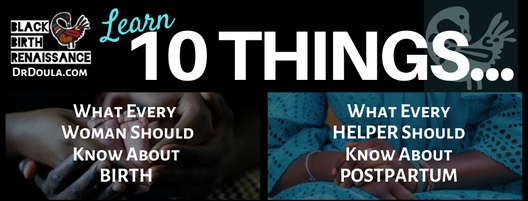
SANKOFA TRIBE SESSIONS, WORKSHOPS & INTENSIVES
Helping get back to the basics of "building birth legacy" and "re-establishing cultural postpartum rituals"
Umsizi is the isiZulu word for helper. During efforts to establish norms and standards for integrating traditional midwives into the broader culture, umsizi was the word that traditional midwives and healers chose to describe some of the people that assist the ababelethisi (midwives). Traditional healers (izangoma) and abalelethisi across South Africa described the work that she and other types of abasizi (helpers) and abazanyane (companions) do. Dr. Doula shares what she has learned about basic expectations of helpers and companions during birth and postpartum through Sankofa Tribe sessions and workshops. Understanding the basic roles and expectations of abasizi and abazanyane during the childbearing year, from an African perspective, is one way to re-establish the indigenous knowledge and practices that have been lost, stolen, forgotten, surrendered & abandoned in the African Diaspora.
Helping get back to the basics of "building birth legacy" and "re-establishing cultural postpartum rituals"
Umsizi is the isiZulu word for helper. During efforts to establish norms and standards for integrating traditional midwives into the broader culture, umsizi was the word that traditional midwives and healers chose to describe some of the people that assist the ababelethisi (midwives). Traditional healers (izangoma) and abalelethisi across South Africa described the work that she and other types of abasizi (helpers) and abazanyane (companions) do. Dr. Doula shares what she has learned about basic expectations of helpers and companions during birth and postpartum through Sankofa Tribe sessions and workshops. Understanding the basic roles and expectations of abasizi and abazanyane during the childbearing year, from an African perspective, is one way to re-establish the indigenous knowledge and practices that have been lost, stolen, forgotten, surrendered & abandoned in the African Diaspora.
|
"SANKOFA WAYS" MENTORING INTENSIVE
In person mentoring in traditional Birth & Postpartum practices In traditional, indigenous cultures, women would not be left to manage alone after they give birth. They would be surrounded by women who knew ways that they could support her and restore her as she sought to adjust to her new life with her baby, a time when women are most vulnerable. "Sankofa Ways" Mentoring Intensive involves practices that are used in the New Mom Renewal Session. The mentoring session is approached from a mind/soul/body/spirit perspective and Dr. Doula facilitates an environment that encourages abasizi (helpers) and abazanyane (companions) to incorporate their own unique gifts, skills and expertise into their work. Birth and postpartum techniques practiced during the in-person, hands-on intensive:
|
You can begin to "reclaim your birth rites" and build legacy as a part of SANKOFA TRIBE with video sessions, in-person workshops or group intensive.
Group Workshops
Note: Dr. Doula's educational resources are available to all with whom her message resonates; however, all services, mentoring and workshops will be presented from the historical context and perspectives of African women on the Continent and throughout the Diaspora. The needs, protection, and promotion of Black women are prioritized.

